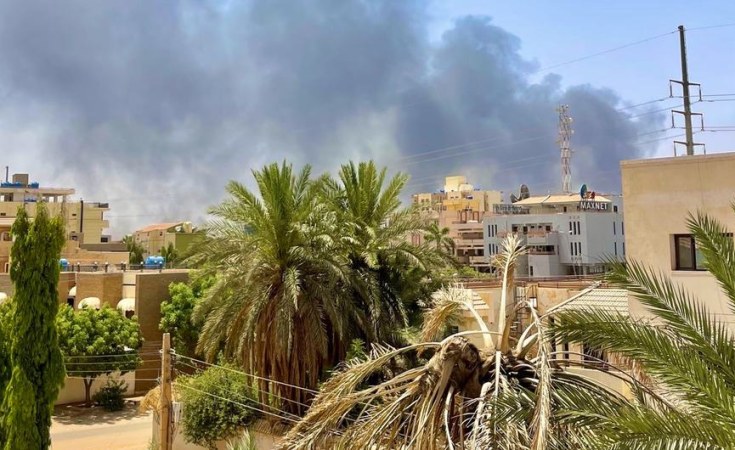Several African countries are evacuating their citizens from Sudan, but Nigerian authorities say they are finding it difficult to get their 5,500 nationals -- mostly students -- out of the country and into safety.
Rukayya Muhammad is a Nigerian student living in Sudan who needs to be evacuated as a matter of urgency.
Thousands of students like Muhammad have been stranded in Sudan since fighting erupted between forces loyal to two rival generals struggling for power.
The conflict -- now in its second week -- has led to tens of thousands of people fleeing to neighboring countries.
Following a public plea for help by students like Muhammad, the Nigerian government plans to start evacuating nearly 3,000 of its nationals -- mostly students -- by a convoy to Egypt later this week.
"I am speaking on behalf of every student, we need help, it's very traumatizing ... we need the Nigerian government to do something, we appeal to the Nigerian government," Muhammad told DW.
'No response' from Nigerian embassy
Foreign countries like Germany, the UK, and the United States have all been rushing to get their nationals out of Sudan.
Nigerian authorities say they have now requested a safe corridor to evacuate 5,500 nationals, mostly students.
Muhammad said not much has been revealed about the so-called evacuation plans.
"I have contacted a few of the students' association bodies here about the situation, whether they have heard something from the embassy, but still they said there wasn't any response from the Nigerian embassy," she said, adding "I have sent them a mail, there also wasn't any response, we haven't heard anything from them."
When speaking to DW, Abdulkadir Mamman Tsagem, another Nigeran national in Sudan, stressed that he and his compatriots deserved to be treated with dignity.
"Considering the situation in Sudan that has forced many countries to evacuate their nationals, our people also deserve to be evacuated, because we cannot predict when the fighting is going to stop," he said.
Challenging evacuation plans
Nigeria's Minister of Foreign Affairs Geoffrey Onyeama said that the process of evacuation was quite challenging considering the sheer number of stranded Nigerians.
There is currently a 72-hour truce in place, which seems to be holding. Onyeama hopes that talks with Sudanese authorities to allow for the safe passage of Nigerians out of the country to neighboring Egypt will be a success.
"We have been working round the clock for the last two days to try and get the Nigerians out," he said. "The only viable way out is by road, but of course, it's not totally safe, so we are going to require the government to provide some security and a safe corridor out."
South Africa, Ghana, Kenya and Uganda are among the African nations which have announced the evacuation of their citizens.
On Monday, Chad also announced that it would evacuate 438 of its nationals from Sudan, including students.
This puts extra pressure on the Nigerian government to treat the repatriation issue as urgent. But Onyeama said Nigeria's situation is unique because of the number of people involved.
"Our situation is particularly challenging, because the numbers are so great. So, essentially, where we are at the moment is trying to get authorization from the Sudanese government for them to provide some security," he said.
Fighting between the army of General Abdel Fattah al-Burhane, Sudan's de facto ruler, and his deputy-turned-rival, General Mohammed Hamdan Dagalo, who commands the paramilitary Rapid Support Forces (RSF), has plunged Sudan into a humanitarian crisis.
Civilians caught up in the fighting
It is not only Nigerian students that are crying for help. Hundreds of other African students say they are unable to contact their countries' consular authorities.
Zenab Abdul Amine Issa, a student from Niger currently living in Al-Jazirah province, south of Khartoum, told DW she was concerned.
"We're so scared, we can't do anything. I am waiting to see if there will be a Nigerien evacuation. I don't have the number of the Nigerien authorities so I cannot leave. I have no one to tell the Nigerien authorities to evacuate me from here," she said.
Power cuts and destruction to infrastructure means is difficult for African foreign nationals stranded to seek help.
"There is no internet, there is nothing! We don't even have call credit to call people who are outside," Issa said.
The World Health Organization (WHO) said that violence in Khartoum and Darfur in the west has left more than 420 people dead and 3,700 injured -- most of whom are civilians.
Health services interrupted
Many humanitarian organizations have suspended their activities, which means the plights of those stranded could worsen even further.
Five aid workers have been killed and, according to the national doctors' union, nearly three-fourths of hospitals are out of service.
Abdullahi Hassan, a Sudan and Somalia researcher for Amnesty International , told DW that the situation on the ground for health workers and aid workers is very troubling.
"Most hospitals in major cities, including Khartoum, have been closed. People have not been able to access them and no services are provided in these health centers," Hassan said.
"Doctors, nurses and other health care workers are targeted, and fear for their own safety. Doctors Without Borders reported that its own center had been looted and targeted. So, people who provide essential health services are not safe right now."
UN Secretary-General Antonio Guterres has expressed concern that the violence in Sudan could spread throughout the region.
Edited by: Keith Walker


